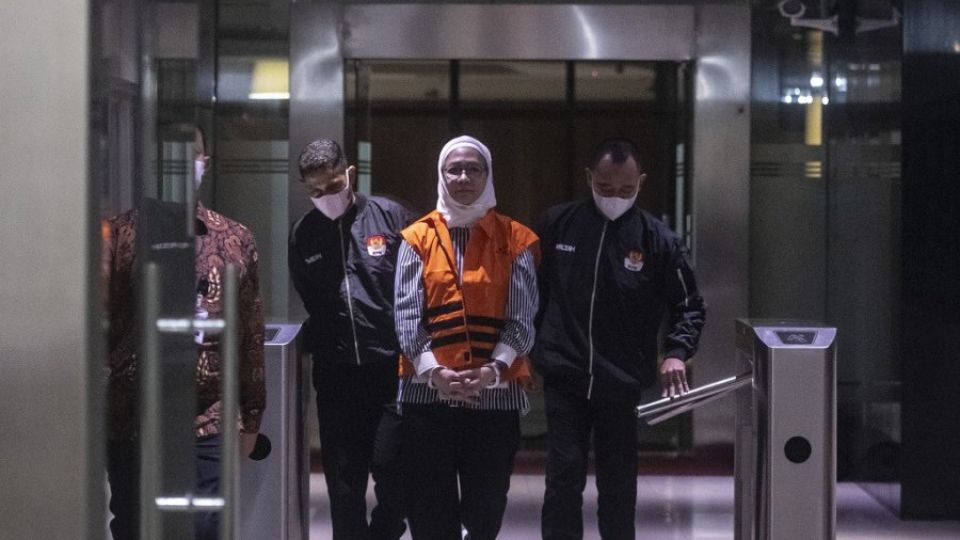September 25, 2023
JAKARTA – Law enforcement institutions, especially the Corruption Eradication Commission (KPK) and the Attorney General’s Office (AGO), have recently launched investigations into graft cases dating back years, raising speculation that such moves are politically driven ahead of the 2024 elections.
Among the latest case to be opened occurred on Tuesday when the KPK named Karen Agustiawan, former president director of state energy firm Pertamina, a suspect in a case pertaining to liquefied natural gas (LNG) procurement between 2011 and 2021.
The case relates to 2012 when Karen, who headed the firm from 2009 to 2014, decided to import LNG through several companies abroad, including United States-based Corpus Christi Liquefaction LLC. The decision was made to prevent an LNG deficit in Indonesia, which was forecast to occur between 2009 and 2040.
KPK chairman Firli Bahuri said the decision to procure the gas was not subject to a business analysis. Karen also did not report the procurement to the Pertamina board of commissioners.
“The plan was also not reported to the shareholders’ meeting, so KA’s move did not receive authorization from the government at that time,” Firli said during the press briefing on Tuesday, referring to Karen by her initials.
The imports eventually resulted in oversupply, which forced the energy firm to sell at a loss causing Rp 2.1 trillion (US$136.6 million) in state losses, according to the antigraft body.
Karen denies the accusation, claiming that she received the government’s authorization for the procurement. She also claimed that the state losses occurred between 2020 and 2021 as an impact of the COVID-19 pandemic.
Read also: KPK leaders in hot water after alleged meeting with detainee
KPK deputy chairman Alexander Marwata brushed off Karen’s defense, saying that the commission “has sufficient evidence on the suspected crime” to name someone a suspect.
“We will clarify and confirm the suspect’s statement during the investigation and trial, where she can defend herself,” he said on Friday.
This is the second time Karen has been implicated in a corruption case. In 2019, a court sentenced her to eight years in prison after being found guilty in a case involving Pertamina’s investment in the Basker Manta Gummy (BMG) Block, in Australia, in 2009.
But the Supreme Court later overturned the verdict and acquitted her of all charges. The panel of justices argued that Karen’s actions were a matter of business judgment rather than a crime.
Old cases, new allies
Prior to Karen being named a suspect, the KPK had also launched an investigation into alleged corruption pertaining to a Rp 20 billion software procurement for migrant workers’ protection at the Manpower Ministry in 2012.
Graft busters summoned National Awakening Party (PKB) chair Muhaimin Iskandar as a witness in the case, just days after his announcement as the running mate of presumptive presidential candidate Anies Baswedan. Muhaimin served as the manpower minister between 2009 and 2014.
The antigraft body had named three suspects when its leaders approved the investigation in July, although it has yet to disclose their identities to the public. The alleged corruption in the Manpower Ministry cost the state some Rp 1 billion in losses, according to the KPK.
Also on Tuesday, the AGO named Sofia Balfas, operations director of PT Bukaka Teknik Utama, as a graft suspect for allegedly rigging the project tender for the construction of the Jakarta-Cikampek II, also known as the Muhammad Bin Zayed (MBZ), elevated toll road in West Java.
The AGO previously also named three other suspects in the case that caused an estimated Rp 1.5 trillion in state losses.
Bukaka Teknik Utama is a construction company that manages multinational projects and is controlled by the family of former vice president Jusuf Kalla, a close ally of Anies.
Political motivation?
Speculation has run rife that the recent spate of investigations launched by law enforcers is politically motivated, as the moves have been made against parties related to candidates in the upcoming presidential election.
Karen’s case occurred in 2012 when Democratic Party founder Susilo Bambang Yudhoyono was still serving as the country’s president. The party has declared support for Gerindra Party chair Prabowo Subianto’s presidential bid and joined his Indonesia Onward Coalition (KIM) electoral alliance.
Zaenur Rohman of the Gadjah Mada University Center for Anti-Corruption Studies (Pukat UGM) said the KPK and AGO had to be transparent in their investigations and not cherry-pick suspects to prove that they were not politically motivated.
“The public, for example, has not received a complete explanation of how the KPK decided to summon Muhaimin, as well as the case’s progress,” he said.
Read also: New graft scandal besets NasDem, challenging Anies’ presidential bid
Both the AGO and KPK have repeatedly asserted that their investigations have nothing to do with the elections or other political motivations.
Speaking about his vision as a presidential candidate, Anies called for the KPK’s independence from every potential conflict of interest, including from the executive branch. Watchdogs have long claimed that the KPK Law revision in 2019 has put the antigraft body within the government’s control and eliminated its independence. (kuk)


